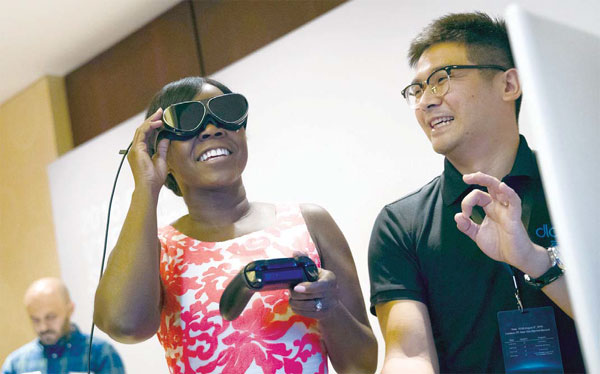Investors making a play for VR startups
At least nine such overseas projects had received capital from 14 Chinese companies by end of July
Chinese investors are seeking foreign virtual reality startups with advanced technology that can help Chinese companies expand abroad.
Data from market researcher Digi-Capital show investment in virtual reality and augmented reality worldwide had reached $1.7 billion by the end of the first quarter of 2016.
|
A woman tries on Dlodlo V1 VR glasses during a media preview at the Marriott Marquis in New York City. Drew Angerer / AFP |
Revenue in the global market is on track to hit $30 billion by 2020, with the Asian market a key driver, it says.
Chinese venture capital firms are naturally shifting focus to investment in VR and AR. At the end of July, at least nine overseas VR projects had received capital from 14 Chinese companies.
China Media Capital, an investment group in Shanghai, and gaming company Shanda Group are among the most active players.
NextVR Inc, a virtual reality startup in California, announced on Aug 15 that it raised $80 million in new financing. New investors in this round include China Media Capital, NetEase Inc, CITIC Guoan Information Industry Co Ltd, Founder H Fund and China Assets (Holdings) Ltd.
NextVR has 36 patents granted or pending for the capture, compression, transmission and display of VR content. With this new funding, it looks to establish a worldwide footprint for its platform for live sports, concerts and other events.
It's the second overseas investment by China Media Capital in the nascent technology in a year. In September, it jointly led a $65 million round of fundraising with The Walt Disney Co and investment firm Evolution Media Partners for Jaunt Inc, another Californian VR software startup.
Li Ruigang, the chairman of China Media Capital, calls the investment an important step in its foray into the global entertainment technology revolution.
According to data analytics platform Tracxn, Shanda is the most active in the global VR investment field. This year, it pledged $350 million to create a VR theme park in partnership with The Void LLC, a US entertainment company that specializes in VR technologies.
In December, Shanda and the private investment group of Chen Tianqiao, the founder of Shanda, invested in Iceland's Solfar Studios to develop its Everest VR, a travel adventure app.
Zhao Ziming, an analyst at Analysys International in Beijing, says overseas projects are leading the pack in VR technologies, and Chinese companies hope to enter the international market by using mature overseas projects. They are focusing on making hardware and the production of VR video content.
However, domestic VR companies will face fierce competition from overseas products.
"Although this may weed out some small and medium-sized startups, it is not a bad thing since more domestic VR enterprises have to produce valuable VR products," Zhao adds.

























